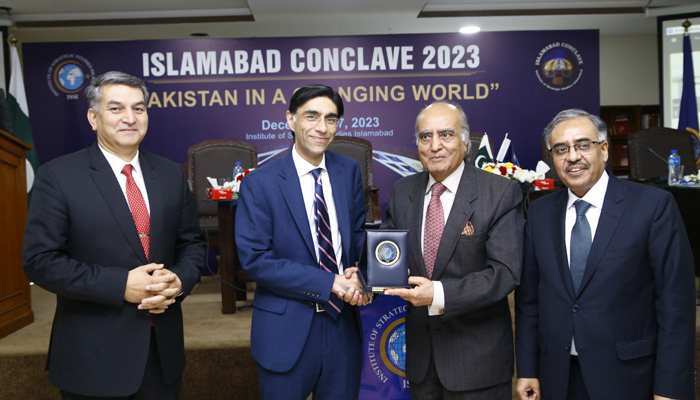‘Controlling negatives crucial for economic security’
Islamabad: Dr Moeed Yusuf, Vice-Chancellor, Beaconhouse National University (BNU), Lahore, has said that for economic security you have to identify what things you will do in the economic sphere that will benefit your overall economy by ensuring that the negatives are curtailed.
Dr Moeed was delivering keynote address on “Navigating complex geopolitics: accentuating pivot to geo-economics” at Islamabad Conclave organised here by Institute of Strategic Studies (ISS).
Dr Moeed said that success of any consensual framework depends on implementation but we are still debating on how to move forward. He stated that the real question regarding geo-economics is on how to move forward. He noted that there is a misconception of what “geo-economics” is as far as Pakistan is concerned.
He said geo-economics in post-cold war became a Machiavellian concept in western world. However, Pakistan adopted a “cooperative geo-economics” framework. Summing up, he said, that we should debate the solutions and problems through geo-economics framework to start working towards our key goals rather than debating if it is good or bad.
Dr Rabia Akhtar, Dean Faculty of Social Sciences, University of Lahore, spoke on operationalising pivot to geo-economics outlining essential pre-requisites that include most importantly political stability in the country followed by rule of law, controlling corruption, macroeconomic stability, diversification of economy promoting public private partnerships and social security. In order to achieve this, we need to collectively acknowledge what needs to be done and then do the needful, she exhorted.
Masood Khalid, former Ambassador to China, said that the Belt and Road Initiative (BRI) is the reincarnation of Chinese philosophical approach of win-win cooperation and peaceful coexistence. Through BRI, China is also helping other economies. CPEC is aligned with China's neighbourhood policy. Where China survives and thrives and the foundation of its stability, development and prosperity lies is its neighbourhood.
Dr Zhang Jiegen of Fudan University stated that if we look back at history, Pakistan adopted the right approach towards geo-economics which had been adopted by China as well during 1970s and early 1980s. The first important point for achieving such a vision for geo-economics is national consensus. The National Security Policy document reflected that all national leaders agreed to this new concept of geo-economics. The policy is an evolving document, and it helps build consensus within the country, he observed.
Naghmana Hashmi, former ambassador to China, said CPEC is an enabler for promoting internal connectivity and Pakistan should adopt a clear tourism policy that provides the sector a status of industry and tax holidays should be given to promote the sector.
-
 Sterling K. Brown's Wife Ryan Michelle Bathe Reveals Initial Hesitation Before Taking On New Role
Sterling K. Brown's Wife Ryan Michelle Bathe Reveals Initial Hesitation Before Taking On New Role -
 BAFTA Film Awards Winners: Complete List Of Winners Updating
BAFTA Film Awards Winners: Complete List Of Winners Updating -
 Millie Bobby Brown On Her Desire To Have A Big Brood With Husband Jake Bongiovi
Millie Bobby Brown On Her Desire To Have A Big Brood With Husband Jake Bongiovi -
 Biographer Exposes Aftermath Of Meghan Markle’s Emotional Breakdown
Biographer Exposes Aftermath Of Meghan Markle’s Emotional Breakdown -
 Backstreet Boys Admit Aging Changed Everything Before Shows
Backstreet Boys Admit Aging Changed Everything Before Shows -
 Ryan Coogler Makes Rare Statements About His Impact On 'Black Cinema'
Ryan Coogler Makes Rare Statements About His Impact On 'Black Cinema' -
 Rising Energy Costs Put UK Manufacturing Competitiveness At Risk, Industry Groups Warn
Rising Energy Costs Put UK Manufacturing Competitiveness At Risk, Industry Groups Warn -
 Kate Middleton Makes Glitzy Return To BAFTAs After Cancer Diagnosis
Kate Middleton Makes Glitzy Return To BAFTAs After Cancer Diagnosis -
 NFL Star Rondale Moore Dies Aged 25, Minnesota Vikings Pay Tribute
NFL Star Rondale Moore Dies Aged 25, Minnesota Vikings Pay Tribute -
 Kim Kardashian Makes Huge Career Move Weeks After Going Public With Lewis Hamilton
Kim Kardashian Makes Huge Career Move Weeks After Going Public With Lewis Hamilton -
 Shia LaBeouf Draws Attention For Sweet Reason After Spending Time In Jail Over Brawl Incident Amid Mardi Gras Bash
Shia LaBeouf Draws Attention For Sweet Reason After Spending Time In Jail Over Brawl Incident Amid Mardi Gras Bash -
 Princess Eugenie, Beatrice Receive Strong Warning After Andrew Arrest: 'Zero Tolerance'
Princess Eugenie, Beatrice Receive Strong Warning After Andrew Arrest: 'Zero Tolerance' -
 Rihanna 38th Birthday Detail Breaks The Internet, Featuring Unexpected Huge Item
Rihanna 38th Birthday Detail Breaks The Internet, Featuring Unexpected Huge Item -
 Liza Minnelli Recalls Rare Backstage Memory With Mum Judy Garland In New Memoir
Liza Minnelli Recalls Rare Backstage Memory With Mum Judy Garland In New Memoir -
 Armed Intruder Shot Dead At Trump's Mar-a-Lago Residence: US Secret Service
Armed Intruder Shot Dead At Trump's Mar-a-Lago Residence: US Secret Service -
 Total Lunar Eclipse: What You Need To Know And Where To Watch
Total Lunar Eclipse: What You Need To Know And Where To Watch




